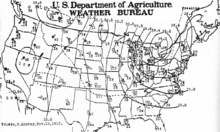Definify.com
Webster 1913 Edition
Isobar
I′so-bar
,Noun.
[
Iso-
+ Gr. [GREEK] weight.] (Phys. Geog.)
A line connecting or marking places upon the surface of the earth where height of the barometer reduced to sea level is the same either at a given time, or for a certain period (mean height), as for a year; an isopiestic line.
[Written also
isobare
.] Definition 2026
Isobar
Isobar
isobar
isobar
See also: Isobar
English

A weather map showing isobars
Noun
isobar (plural isobars)
- (meteorology) A line drawn on a map or chart connecting places of equal or constant pressure.
- (nuclear physics) Either of two nuclides of different elements having the same mass number.
- (thermodynamics) A set of points or conditions at constant pressure.
Usage notes
- (meteorology):
- In meteorology, the term isobar most often refers to a line drawn through connected points of equal atmospheric pressure on a given reference surface — such as a constant height surface (notably mean-sea-level on surface charts), the vertical plane of a synoptic cross section, or a layer of the air unaffected by surface heating or cooling. The pattern of isobars has always been a main feature of surface chart analysis. (See
 Surface weather analysis on Wikipedia.Wikipedia ) Until recently it was standard procedure to draw isobars at 3-millibar intervals. However, the advent of constant pressure charts for upper-air analysis has brought about the use of 4-millibar intervals to simplify the conversion from surface isobars to 1,000-millibar contour lines.
Surface weather analysis on Wikipedia.Wikipedia ) Until recently it was standard procedure to draw isobars at 3-millibar intervals. However, the advent of constant pressure charts for upper-air analysis has brought about the use of 4-millibar intervals to simplify the conversion from surface isobars to 1,000-millibar contour lines.
- In meteorology, the term isobar most often refers to a line drawn through connected points of equal atmospheric pressure on a given reference surface — such as a constant height surface (notably mean-sea-level on surface charts), the vertical plane of a synoptic cross section, or a layer of the air unaffected by surface heating or cooling. The pattern of isobars has always been a main feature of surface chart analysis. (See
Translations
A line on a map connecting places of equal pressures
either of two nuclides
See also
German
Pronunciation
- Rhymes: -aːɐ̯
Adjective
isobar (not comparable)
Declension
Declension of isobar
| number & gender | singular | plural | |||
|---|---|---|---|---|---|
| masculine | feminine | neuter | all genders | ||
| predicative | er ist isobar | sie ist isobar | es ist isobar | sie sind isobar | |
| strong declension (without article) |
nominative | isobarer | isobare | isobares | isobare |
| genitive | isobaren | isobarer | isobaren | isobarer | |
| dative | isobarem | isobarer | isobarem | isobaren | |
| accusative | isobaren | isobare | isobares | isobare | |
| weak declension (with definite article) |
nominative | der isobare | die isobare | das isobare | die isobaren |
| genitive | des isobaren | der isobaren | des isobaren | der isobaren | |
| dative | dem isobaren | der isobaren | dem isobaren | den isobaren | |
| accusative | den isobaren | die isobare | das isobare | die isobaren | |
| mixed declension (with indefinite article) |
nominative | ein isobarer | eine isobare | ein isobares | (keine) isobaren |
| genitive | eines isobaren | einer isobaren | eines isobaren | (keiner) isobaren | |
| dative | einem isobaren | einer isobaren | einem isobaren | (keinen) isobaren | |
| accusative | einen isobaren | eine isobare | ein isobares | (keine) isobaren | |